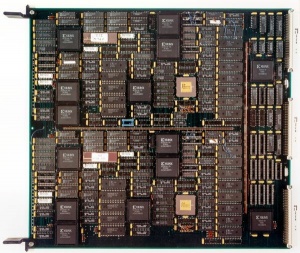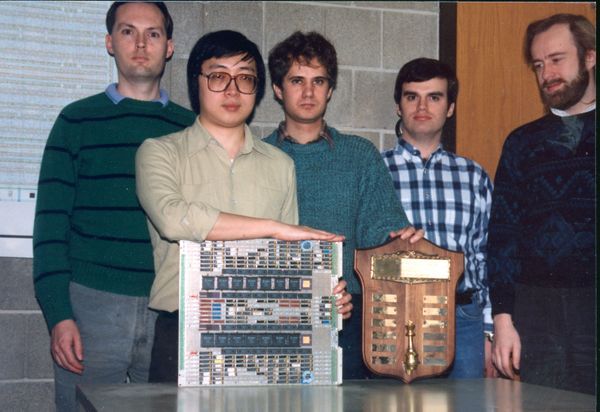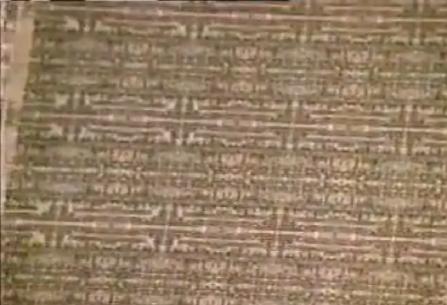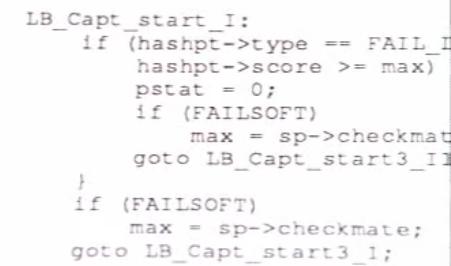Difference between revisions of "Deep Thought"
GerdIsenberg (talk | contribs) |
GerdIsenberg (talk | contribs) |
||
| (2 intermediate revisions by the same user not shown) | |||
| Line 34: | Line 34: | ||
* [[ChipTest]] | * [[ChipTest]] | ||
* [[Deep Blue]] | * [[Deep Blue]] | ||
| + | * [[Deep Blue#DowntheRabbitHole|Deep Blue | Down the Rabbit Hole Video]] | ||
* [[Eval Tuning in Deep Thought]] | * [[Eval Tuning in Deep Thought]] | ||
* [[Kasparov versus Deep Thought 1989]] | * [[Kasparov versus Deep Thought 1989]] | ||
| Line 66: | Line 67: | ||
* [http://groups.google.com/group/rec.games.chess/browse_frm/thread/eecc575a7e25fdd3# A second look at the Nolot positions] by [[Feng-hsiung Hsu]], [[Computer Chess Forums|rec.games.chess]] August 2, 1994 | * [http://groups.google.com/group/rec.games.chess/browse_frm/thread/eecc575a7e25fdd3# A second look at the Nolot positions] by [[Feng-hsiung Hsu]], [[Computer Chess Forums|rec.games.chess]] August 2, 1994 | ||
* [http://groups.google.com/group/rec.games.chess/browse_frm/thread/195d7f43cbe85c98 Deep Thought] by Thorsten Heedt, [[Computer Chess Forums|rec.games.chess]], April 11, 1995 | * [http://groups.google.com/group/rec.games.chess/browse_frm/thread/195d7f43cbe85c98 Deep Thought] by Thorsten Heedt, [[Computer Chess Forums|rec.games.chess]], April 11, 1995 | ||
| + | * [https://www.stmintz.com/ccc/index.php?id=13703 LCT II Fin4, Deep Thought, and Deep Blue (was Re: LCT II results...)] by [[Albert Silver]], [[CCC]], January 05, 1998 » [[LCT II]] | ||
* [https://www.stmintz.com/ccc/index.php?id=22438 Valvo-DT CC-games] by Hans Christian Lykke, [[CCC]], July 18, 1998 » [[Michael Valvo|Mike Valvo]] | * [https://www.stmintz.com/ccc/index.php?id=22438 Valvo-DT CC-games] by Hans Christian Lykke, [[CCC]], July 18, 1998 » [[Michael Valvo|Mike Valvo]] | ||
==2000 ...== | ==2000 ...== | ||
| Line 83: | Line 85: | ||
=External Links= | =External Links= | ||
* [https://en.wikipedia.org/wiki/Deep_Thought_%28chess_computer%29 Deep Thought from Wikipedia] | * [https://en.wikipedia.org/wiki/Deep_Thought_%28chess_computer%29 Deep Thought from Wikipedia] | ||
| + | * [http://www.computerhistory.org/chess/challenging-the-world-champion/ Challenging the World Champion | Mastering the Game] [[The Computer History Museum]] | ||
* [https://www.game-ai-forum.org/icga-tournaments/program.php?id=349 Deep Thought's ICGA Tournaments] | * [https://www.game-ai-forum.org/icga-tournaments/program.php?id=349 Deep Thought's ICGA Tournaments] | ||
* [http://www.chessgames.com/player/deep_thought.html Deep Thought's games from chessgames.com] | * [http://www.chessgames.com/player/deep_thought.html Deep Thought's games from chessgames.com] | ||
| Line 92: | Line 95: | ||
<references /> | <references /> | ||
'''[[Engines|Up one Level]]''' | '''[[Engines|Up one Level]]''' | ||
| + | [[Category:Mainframe]] | ||
[[Category:Fiction]] | [[Category:Fiction]] | ||
[[Category:Douglas Adams]] | [[Category:Douglas Adams]] | ||
[[Category:Thought]] | [[Category:Thought]] | ||
Latest revision as of 18:25, 4 November 2020

Deep Thought,
was a computer chess machine built at Carnegie Mellon University in the 1980's, the predecessor to Deep Blue. The project was initially started 1985 as ChipTest by the computer science doctoral students Feng-hsiung Hsu and Thomas Anantharaman. Murray Campbell, former co-developer of HiTech, joined the ChipTest team a few month later - followed by Andreas Nowatzyk, Mike Browne and Peter Jansen. The program was named Deep Thought after the fictional computer of the same name [2] .
Contents
Photos
Murray Campbell, Feng-hsiung Hsu, Thomas Anantharaman, Mike Browne and Andreas Nowatzyk,
after winning the Fredkin Intermediate Prize for Deep Thought's Grandmaster-level performance. [3]
Achievements
- In 1988 Deep Thought and Grandmaster Tony Miles shared first place in the Software Toolworks Open in Los Angeles. Deep Thought had a 2745 performance rating, and moved its U.S. Chess Federation (USCF) rating up to 2551, and qualified for the $10,000 Fredkin Intermediate Prize as the first computer to achieve a USCF performance rating of 2500 over a set of 25 contiguous games in human tournaments [4]
- In 1988 Deep Thought won the ACM championship in Orlando
- In 1989 Deep Thought won the 6th World Computer Chess Championship in Edmonton, with a perfect 5-0 score
- In 1989 Garry Kasparov defeated Deep Thought in a match by winning 2 games
- In 1989 Deep Thought won the ACM championship in Reno (tied with HiTech [5])
- In 1989 Deep Thought beat International Master David Levy in a match with 4 wins
- In 1989 IBM started working on Deep Blue
- In 1990 Deep Thought won the ACM championship in New York City
- In 1991 Deep Thought II won the ACM championship in Albuquerque
- In 1994 Deep Thought II won the ACM championship in Cape May
Hardware
Photomask of the move generation chip, a combinational logic 8x8 array [6]
Software
View into Deep Thought's source written in C with gotos [7]
See also
- ChipTest
- Deep Blue
- Deep Blue | Down the Rabbit Hole Video
- Eval Tuning in Deep Thought
- Kasparov versus Deep Thought 1989
- Levy versus Deep Thought 1989
Publications
- Thomas Anantharaman, Murray Campbell, Feng-hsiung Hsu (1988). Singular extensions: Adding Selectivity to Brute-Force Searching. AAAI Spring Symposium, Computer Game Playing, also in ICCA Journal, Vol. 11, No. 4, and (1990) in Artificial Intelligence, Vol. 43, No. 1
- Feng-hsiung Hsu (1988). The Software Toolworks Open Championship. ICCA Journal, Vol. 11, No. 4
- Hans Berliner (1989). Deep Thought Wins Fredkin Intermediate Prize. AI Magazine, Vol. 10, No. 2, pdf
- David Levy (1990). The End of an Era. ICCA Journal, Vol. 13, No. 1 » Levy versus Deep Thought 1989
- Michael Valvo (1990). Moral Victory: Karpov versus Deep Thought at Harvard. ICCA Journal, Vol. 13, No. 1 [8]
- Feng-hsiung Hsu, Thomas Anantharaman, Murray Campbell, Andreas Nowatzyk (1990). Deep Thought. Computers, Chess, and Cognition
- Feng-hsiung Hsu, Thomas Anantharaman, Murray Campbell, Andreas Nowatzyk (1990). A Grandmaster Chess Machine. Scientific American, Vol. 263, No. 4
- Frederic Friedel (1991). Not the Mother of all Chess Machines. ICCA Journal, Vol. 14, No. 2 [9]
- Robert Levinson (1991). Man and machine, theory and practice square off in Sydney. ICCA Journal, Vol. 14, No. 3 [10] [11]
- Paul Hsieh (1996). Deep Blue - Deep Thought 2. Computer Chess Reports, Vol 5, No 3+4
Forum Posts
1989
- Valvo-DT Match: Move 46 by Mike Valvo, rec.games.chess, March 30, 1989
- Challange Match by Mike Valvo, rec.games.chess, March 31, 1989
- Valvo-DT Match: Move 48 by Mike Valvo, rec.games.chess, April 01, 1989
- World Computer Chess Championship (the human side) by Feng-hsiung Hsu, rec.games.chess, June 04, 1989 » WCCC 1989
- DT - Kasparov : 0-2 by Peter Jansen, rec.games.chess, October 23, 1989 » Kasparov versus Deep Thought 1989
- Levy - DT match (1) by Peter Jansen, rec.games.chess, December 22, 1989 » Levy versus Deep Thought 1989
- Levy - DT match (2) by Peter Jansen, rec.games.chess, December 22, 1989
- Levy - DT match (3) by Peter Jansen, rec.games.chess, December 23, 1989
- Levy - DT match (4) by Peter Jansen, rec.games.chess, December 23, 1989
1990 ...
- Karpov-DT Match, Face to Screen by Feng-hsiung Hsu, rec.games.chess, February 04, 1990
- Nolot's 11 difficult positions (possible spoilers) by Feng-hsiung Hsu, rec.games.chess, July 29, 1994 » The Nolot Suite
- A second look at the Nolot positions by Feng-hsiung Hsu, rec.games.chess August 2, 1994
- Deep Thought by Thorsten Heedt, rec.games.chess, April 11, 1995
- LCT II Fin4, Deep Thought, and Deep Blue (was Re: LCT II results...) by Albert Silver, CCC, January 05, 1998 » LCT II
- Valvo-DT CC-games by Hans Christian Lykke, CCC, July 18, 1998 » Mike Valvo
2000 ...
- Nolot Bxh7 and deep thought/deep blue by Vincent Diepeveen, CCC, January 12, 2000 » The Nolot Suite
- Deep Thought's rating during the race for the Fredkin prize by Robert Hyatt, CCC, January 21, 2000 » Fredkin Prize
- Deep Thought's tuning code and eval function! by Severi Salminen, CCC, September 05, 2000 » Eval Tuning in Deep Thought
- Some facts about Deep Thought / Deep Blue by Erkki Malkamaki, CCC, August 29, 2001
- The Deep Thought Code by Joshua Lee, CCC, September 07, 2001
- positions when deep thought blundered by Uri Blass, CCC, August 20, 2002
- What Was Deep Thought's ICC Rating?? by Joshua Lee, CCC, March 20, 2003
- karpov - deep thought 1990 by Richard Bean, CCC, June 17, 2003
- DEEP THOUGHT ... by Guy Haworth, CCC, August 13, 2004
- Test Position = GM Tony Miles vs Deep Thought, 1989 [14...Bxh2!!] by José Antônio Fabiano Mendes, CCC, September 09, 2004
- Re: Which Mephisto Version Beat Deep Thought? by Steve B, CCC, January 04, 2005 » ACM 1989, Mephisto X
- Deep Thought eval -- Request by Stuart C by Charles Roberson, CCC, December 24, 2005
External Links
- Deep Thought from Wikipedia
- Challenging the World Champion | Mastering the Game The Computer History Museum
- Deep Thought's ICGA Tournaments
- Deep Thought's games from chessgames.com
- Deep Thought from Tim Mann's Chess Pages
- Source code to tune Deep Thought's evaluation in tar.gz format.
- Andreas Nowatzyk's explanations of the the source code
References
- ↑ Deep Thought I circuit board ca. 1988 Photo by Feng-hsiung Hsu hosted by The Computer History Museum
- ↑ The Hitchhiker's Guide to the Galaxy from Wikipeadia
- ↑ Deep Thought team with Fredkin Intermediate Prize 1988, Gift of Feng-hsiung Hsu hosted by The Computer History Museum
- ↑ Hans Berliner (1989). Deep Thought Wins Fredkin Intermediate Prize. AI Magazine, Vol. 10, No. 2, pdf
- ↑ Aegon Tournament 1990; Hitech best overall by Hans Berliner, rec.games.chess, May 25, 1990
- ↑ from Kasparov versus Deep Thought 1989 documentary, Video 2, 10:49
- ↑ from Kasparov versus Deep Thought 1989 documentary, Video 2, 13:35
- ↑ Karpov vs. DEEP THOUGHT Cambridge, Massachusetts reported by Darren Bedwell, Compuserve 73
- ↑ CeBIT, Hannover 1991 - 365Chess.com Tournaments
- ↑ 12. IJCAI 1991 and Deep Thought vs. Darryl Johansen 1-1, Sydney, August 28, 1991
- ↑ Deep Thought vs. Darryl K. Johansen from chessgames.co


